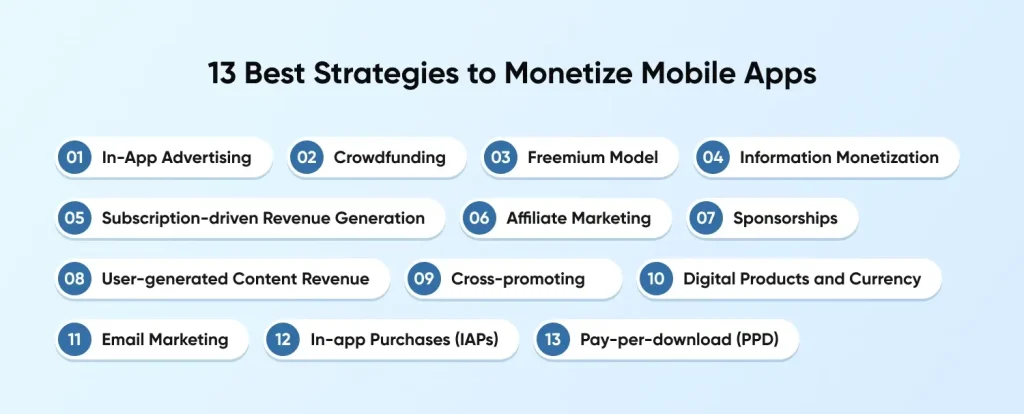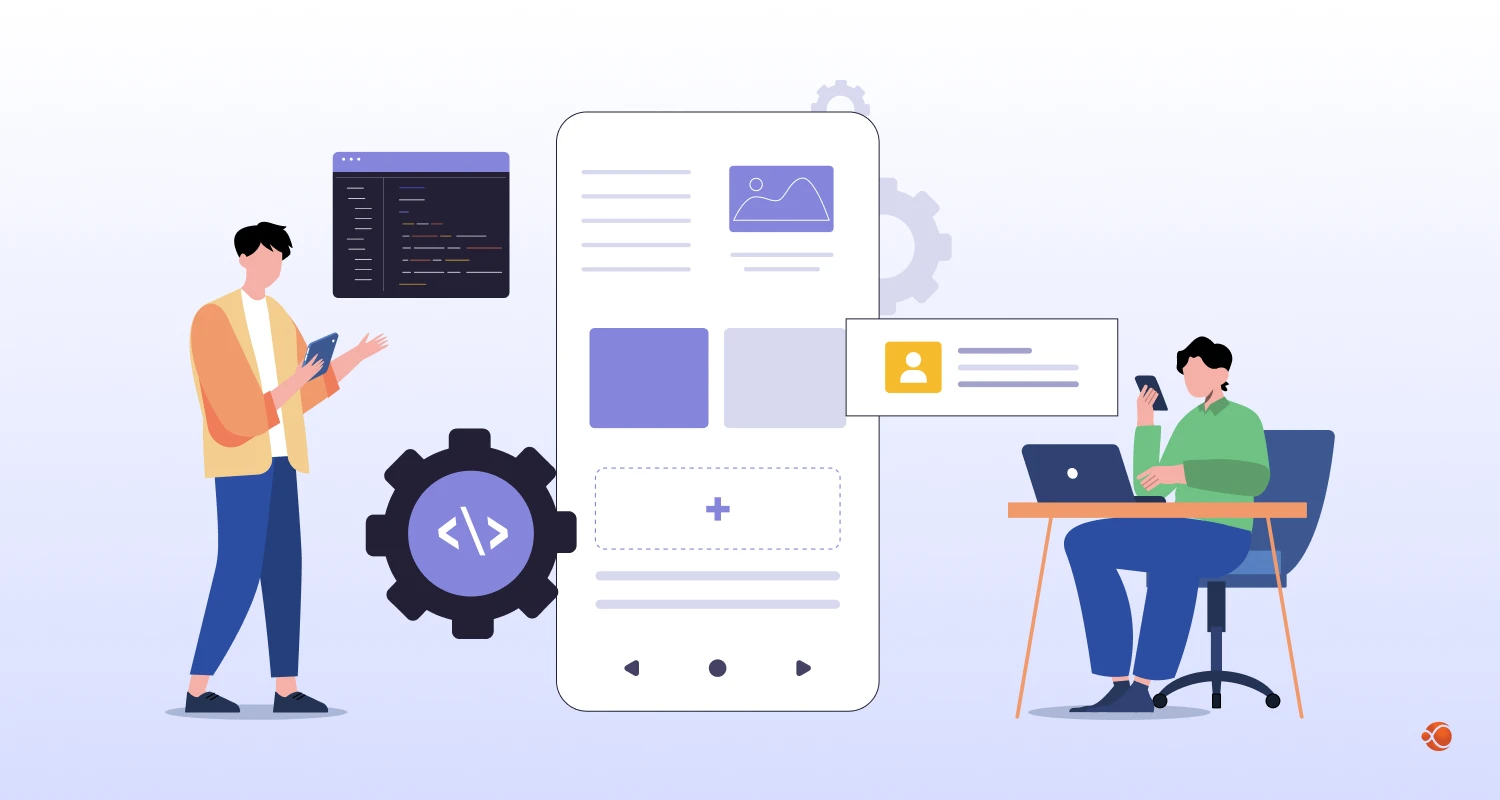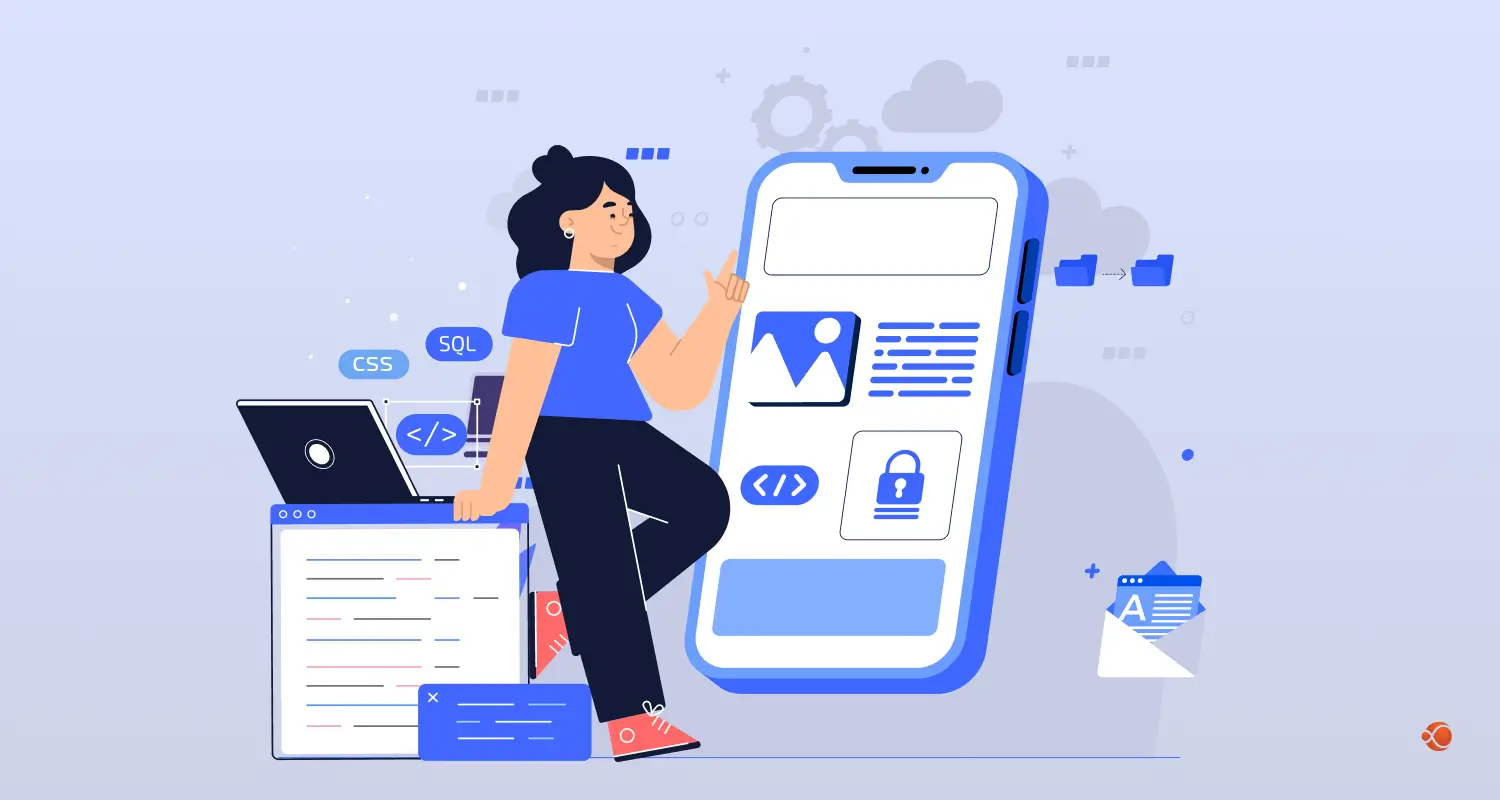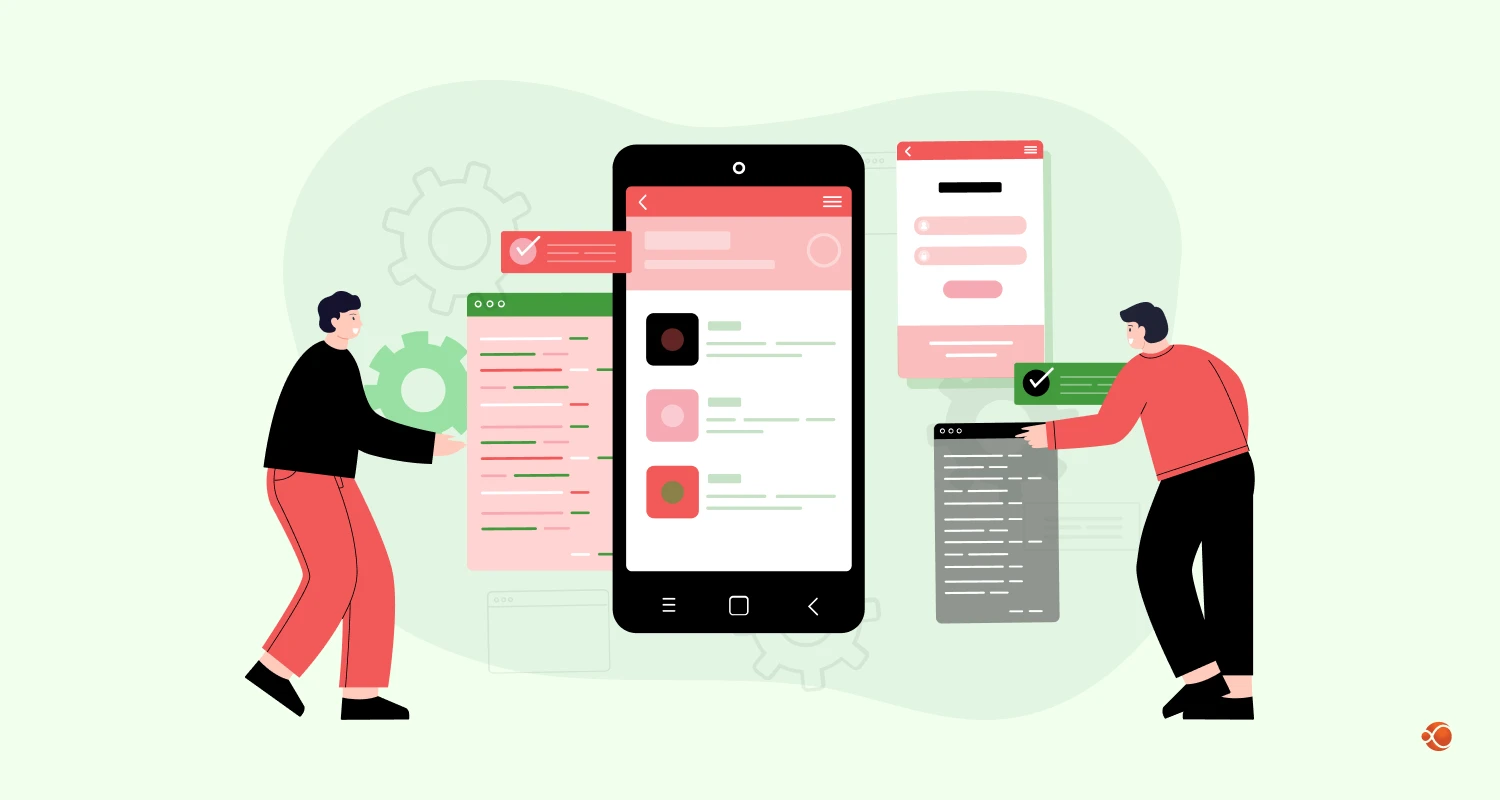You have finally made it!
Finally, a mobile application is not created up and running for your business.
Your customers may now engage with you at a level that has never been possible, and the information you are gleaning from the app is assisting you in coming up with a myriad of fresh ideas for brand promotion.
The difficulty is in becoming an expert at creating apps to make money. Why? Well, since in terms of downloads and revenue, free mobile apps have consistently surpassed commercial ones.
About 1.8 million apps could be downloaded from the Apple App Store and almost 2.4 million could be found on the Google Play Store as of January 2025. But the typical app download is expected to be $1.79 in income.
This blog post will explain the app monetization strategies that help to increase the business revenue.
What is Mobile App Monetization and Why Monetizing Apps is Important?
The technique of making money from a fully functional mobile application is known as mobile app monetization. All users who download these apps make use of the various ways to monetize apps, such as in-app purchases, in-app advertising, and free models. It takes time to comprehend and determine which model is most appropriate for your business, but it is crucial to incorporate it into your app revenue-generating strategy.
At the moment, the main four monetization strategies are:
- Banner advertisements
- Videos for advertisements
- Interstitial advertisements
- Native advertisements
Hire mobile app developers to use one of the following app monetization models to make sure their app keeps making money while offering a great user experience. As an alternative, they can use an iOS or Android app monetization strategy that combines two or more ways to make money.
13 Best Strategies to Monetize Mobile Apps

Mobile app monetization models include a range of ways to make money. Typical strategies include non-intrusive advertising and in-app sales, where users pay for virtual goods or premium services.
Additional possibilities provided by freemium and subscription models help developers balance user delight with long-term revenue sources for their programs. Consult the best mobile app development company to get a robust application to provide post-deployment services and improve monetization services.
1. In-App Advertising
To make money, a mobile app business plan should include in-app advertising that incorporates advertisements into the app’s user experience. By carefully placing adverts, this technique makes sure they enhance rather than detract from the user experience. App development professionals balance user engagement and revenue creation by using non-intrusive formats and pertinent content.
Reaching a large audience with in-app advertising is successful because it gives sponsors a stage to highlight their goods or services while giving consumers a free or discounted app experience.
2. In-app Purchases (IAPs)
The in-app purchase monetization strategy allows users to buy virtual goods within the application. Since the concept allows users to customize their app experience according to their preferences, it is most effective at increasing user engagement and happiness.
Experts in app advertising provide a variety of alluring products or features for sale to generate income directly. App success is largely attributed to the widespread use of in-app purchases across a range of app genres, including productivity and gaming. It also gives developers a strong source of income by giving users a customized and improved experience.
3. Freemium Model
The freemium app monetization approach combines elements of in-app advertising and paid apps/subscriptions with other approaches. Offering certain features or content of your app for free while charging users who desire the complete experience a one-time cost or a monthly subscription is known as the freemium app monetization model.
By adding more features, users may customize their experience and give developers an adaptable source of income. The freemium business model is based on finding a happy medium between giving free users something of value and luring premium users to pay for an improved app experience.
4. Subscription-driven Revenue Generation
The most sustainable revenue strategy is this one, in which customers pay regular payments. When it comes to accessing premium content, features, or services within a mobile app, the defined periods are often either monthly or yearly.
For developers, this tactic offers a steady and reliable revenue source. In addition to attaining greater mobile app security, users gain ongoing access to valuable content, resulting in a win-win situation.
Subscription-based monetization is popular in productivity, news, and multimedia streaming apps; it also helps the development of over-the-top (OTT) applications and fosters customer loyalty. This guarantees that developers can provide high-quality updates and experiences for a long time.
5. Sponsorships
Apps can be profitable through sponsorships, where businesses pay to be associate with the app for marketing campaigns. Developers may increase user engagement and generate additional money by effortlessly integrating brand services.
Partnerships and sponsorships offer brands a focus platform to present their goods or services, are adaptable, and can be used in various app genres. This model provides developers with financial backing and brand access to a carefully selected audience, fostering mutually beneficial connections.

6. Digital Products and Currency
Users can obtain concrete benefits from virtual items and currencies, which makes this approach suitable for apps that are both entertainment- and utility-focused. Users buy in-app cash or digital goods under this monetization technique to improve their mobile app experience.
It is widely used in virtual marketplaces and games, where users may purchase customizable items directly from the app. Conversely, developers gain from enhanced user engagement and a new source of income due to the ability to access exclusive features, personalize avatars, and expedite in-game advancement.
7. User-Generated Content Revenue
One of the most important methods for monetizing apps is to employ user-generated content, which allows users’ material to be turned into income. Platforms that use this tactic to capitalize on the creativity and engagement of their user base frequently include advertisements or provide premium subscriptions.
Contributions from users, whether they take the form of articles, movies, or other types of content, become important resources for the app’s ability to generate income. Developers can design a strategy that is sustainable and leverages user-generated content as a key driver of engagement and revenue.
They may accomplish this by giving users a forum to express themselves and by putting monetization techniques into place early in the process of developing mobile apps.
8. Affiliate Marketing
When users use these links to make purchases, developers incorporate special affiliate links or codes into the app, and the app gets a pre-agreed percentage of the sale.
A significant component of mutually beneficial app monetization strategies is the performance-based approach. Successful recommendations bring in money for app developers, while affiliate partners profit from more visibility and possible sales. Through cooperative marketing efforts, it creates a dynamic revenue stream by matching user interests with external offerings.
9. Pay-per-download (PPD)
Users who choose the pay-per-download (PPD) model of direct app monetization pay a single fee to download the app. With each app installation, this simple method guarantees developers receive money right away.
PPD is a component of this type of mobile app architecture, which makes it easy and efficient to make money by doing away with the requirement for recurring purchases or subscriptions. To access the features, content, or functionalities of the app, users must pay a set amount, usually upfront. With its transparent value proposition and easy-to-understand financial transactions, this model appeals to a wide range of consumers and developers.
10. Information Monetization
Utilizing user data that has been collect with consent for a variety of revenue-generating reasons is known as data monetization. This tactic increases the total revenue of the program by turning user data into a valuable asset.
With data monetization, developers can generate income beyond the app’s core features while adhering to privacy standards and obtaining user agreement. Apps may offer personalized experiences and develop a viable income model through data-driven tactics by ethically utilizing user insights.
11. Cross-Promoting
Experts in app promotion employ this tactic, in which users of various apps endorse one another within their user bases. This win-win strategy promotes user acquisition and increases visibility without requiring direct financial transactions. Apps utilize their current user trust to their advantage by displaying promotions or connections to partner apps strategically to drive downloads and engagement.
Cross-promotion can be a cheap strategy that promotes community development and improves user experience in general. By coordinating with complimentary apps, developers create a network that amplifies user reach.
12. Email Marketing
Email marketing is a useful tool to engage app users to convert them into subscription or purchase users. It may not be a natural fit for the app advertising but this model is less expensive and simple to set up. User email addresses can be accessed using a straightforward in-app subscription, allowing for the sending of numerous marketing emails.
13. Crowdfunding
Especially in the early phases of a free app’s development, crowdfunding can be a useful tool for raising money for a project. Crowdfunding sites like Kickstarter, IndieGoGo, GoFundMe, and Patreon can provide app developers with revenue potential that is comparable to those of very few other tactics if they are used properly.
Conclusion
You know by now how great a mobile app can be for your business’s revenue. It can help you build relationships with clients you might not have otherwise been able to reach and grow your brand. Additionally, as this essay has shown, it can be a sizable source of income.
App developers need to know the best ways to monetize their work if they want to succeed. The ideal app monetization strategy for you and your app may not be the same as the ones I use and find to be most effective.
White-label apps are another avenue for further revenue generation. Use these application monetization services for your mobile app, and you’ll see that your company is starting to make more money from apps than ever.
Frequently Asked Questions
How to Monetize Mobile Apps?
These strategic mobile app monetization options can help maximize your app revenue:
In-app purchases
Email marketing
Subscription-based model
Affiliate marketing
Pay-per-click model
Freemium model
Sponsorship based
Which Monetization Strategy Is Best for My App?
In-app purchase is the most simple and easy way of monetization strategy. Customers who are looking to use the premium features can purchase within the application and improve the experience of the mobile application.
Are Mobile App Ads Profitable?
App advertising has the potential to be profitable if used properly. It is important to choose native or rewarded ads, balance ad frequency and relevancy, and keep user experience in mind. Ads can supplement other forms of app monetization by giving it an extra source of income.
How to Measure Success from Mobile App Strategy?
Maintaining constant monitoring of critical data is important to optimizing your app approach.
These include:
Retention Rate: The best way to make money through the app is to retain the users who are dedicated to your app. They are most likely to upgrade and use the premium features with the in-app purchase options.
The average revenue per user, or ARPU: This is the key indicator of how much a user is paying you through the application usage of the service you provide through the application.
App stickiness: This term describes how much people will interact with your application.
Lifetime value (LTV): This measures the value of a user throughout their app usage. It’s a crucial indicator that aids in understanding the maximum amount of money that marketers can spend on advertising.







